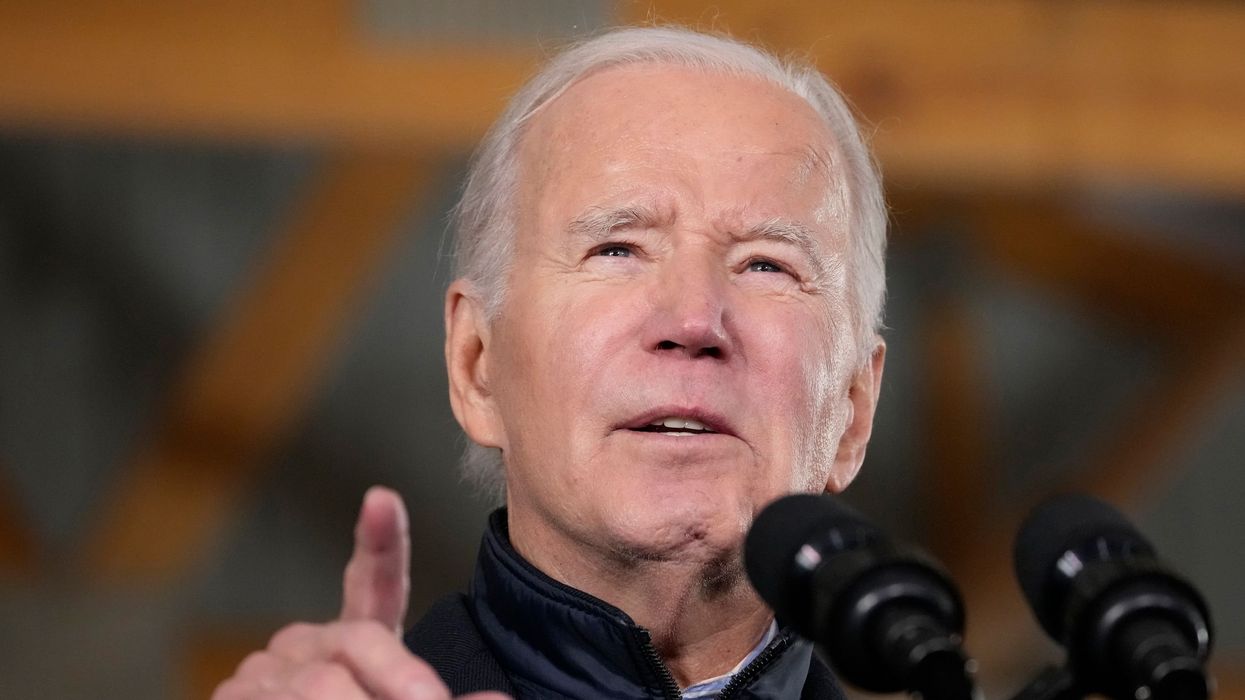
Video Source: Advocate Channel
Washington (CNN) — President Joe Biden and his top advisers are warning Israel with growing force that it will become increasingly difficult for it to pursue its military goals in Gaza as global outcry intensifies about the scale of humanitarian suffering there.
Biden, Defense Secretary Lloyd Austin and Secretary of State Antony Blinken – who departed Thursday for Israel with a message on protecting civilian lives – have all explicitly pressed the case in recent private conversations with the Israelis, telling them that eroding support will have dire strategic consequences for Israel Defense Forces operations against Hamas.
Behind the scenes, American officials also believe there is limited time for Israel to try to accomplish its stated objective of taking out Hamas in its current operation before uproar over the humanitarian suffering and civilian casualties – and calls for a ceasefire – reaches a tipping point.
In fact, there is recognition within the administration that that moment may arrive quickly: Some of the president’s close advisers believe that there are only weeks, not months, until rebuffing the pressure on the US government to publicly call for a ceasefire becomes untenable, sources told CNN.
There have been no signs that Israel’s offensive is slowing. The Israeli military said Thursday it is surrounding Gaza City and “deepening” its operations there. CNN witnessed the skies of Northern Gaza illuminated by flares and explosions as the bombardment intensified late Thursday night.
Particularly jarring to Biden and his national security team, two sources familiar with the matter said, were Israeli airstrikes this week that targeted a refugee camp in northern Gaza, resulting in grim scenes of widespread destruction and deaths. The president “didn’t like this at all,” one of the sources said.
“The problem for [Israel] is that the criticism is getting louder, not just among their detractors, but from their best friends,” one senior administration official said.
Israel Defense Forces spokesman Lt. Col. Jonathan Conricus claimed the strike was targeting a Hamas commander hiding in an underground bunker and that when the complex imploded it possibly collapsed nearby buildings.
Already, protests have blocked streets in Western capitals and even interrupted a private fundraiser Biden attended Wednesday in Minnesota. “As a rabbi I need you to call for a ceasefire right now,” an audience member shouted.
Biden responded by making an explicit call for a break in the fighting: “I think we need a pause,” he said, adding later when pressed by the protester: “A pause means give time to get the prisoners out.”
The president has not established any red lines for Israel, officials insist. And up until this point, the White House has taken great pains to avoid calling for a ceasefire, arguing that doing so would only help Hamas by giving the terrorist organization time to regroup and plot future operations.
Biden has told Israeli Prime Minister Benjamin Netanyahu that the relentless images of Palestinian women and children being pulled from rubble could start to narrow Israel’s ability to move forward with its current operation, according to senior administration officials.
In conversations with Netanyahu, Biden has warned that Israel will be judged harshly by the international community if it doesn’t take steps to significantly ease humanitarian suffering and minimize Palestinian civilian deaths.
And that isn’t just limited to IDF’s operation in Gaza: In a call with Netanyahu on Sunday, Biden told the prime minister he was concerned about the surge in violence against Palestinians by Israeli settlers in the West Bank and was emphatic that that the attacks had to stop, according to a source briefed on the conversation.
Biden and top national security officials have also ramped up their calls for humanitarian pauses in the fighting to allow Hamas-held hostages to come out of Gaza and aid to flow in.
Those pauses – which US officials say are entirely different from a ceasefire and localized in scope and limited in duration – are one of several specific issues top American officials have pressed Israel on in recent days as outcry mounts over the suffering of Palestinian civilians.
Others include maintaining phone and internet connectivity on the strip, allowing fuel and water into Gaza and curbing escalating violence on the West Bank, according to people familiar with the matter. The Israel military says there are fuel supplies in Gaza being held by Hamas, which are not being distributed for humanitarian purposes, CNN has reported.
Over the course of their 10 phone calls, Biden has pressed Netanyahu on specific points and action items, including significantly increasing the number of aid trucks allowed into Gaza, facilitating the departure of foreign nationals from Gaza and curbing extremist settler violence against Palestinians on the West Bank.
Departing Thursday for a visit to Israel, Blinken said he intended to discuss “concrete steps that can and should be taken to minimize harm to men, women and children in Gaza.”
“I’m not going to get into the details here, but it’s very much on the agenda,” he said in front of his airplane at Joint Base Andrews.
“When I see a Palestinian child, a boy or a girl pulled from the rubble of a collapsed building, that hits me in the gut as much as seeing a child in Israel or anywhere else. So, this is something that we have an obligation to respond to, and we will,” he added.
Asked by CNN if Israel had shown restraint in its offensive in Gaza, Blinken did not offer a yes or no answer, and instead reiterated that Israel has the right to defend itself and the “responsibility to do everything possible to protect civilians.”
Other Democrats close to the White House have increasingly adopted a different, tougher tone.
“It’s time for Israel’s friends to recognize that the current approach is causing an unacceptable level of civilian harm and does not appear likely to achieve the goal of ending the threat from Hamas. I urge Israel to immediately reconsider its approach,” said Sen. Chris Murphy of Connecticut in a statement Thursday.
Pentagon officials believe Israel has been striking legitimate Hamas targets, including some senior commanders. As questions grow over just how much influence the US has over Israeli decision-making, there is a sense that Israel has calibrated its strategy in its ground invasion based on advice from American military officials, officials said.
Austin has been very direct in his near-daily conversations with Israeli Defense Minister Yoav Gallant, defense officials said, pressing him for details on Israel’s objectives in Gaza and reiterating how important it is for Israel to be seen by the international community as working to protect civilians. And Chairman of the Joint Chiefs of Staff Gen. CQ Brown stressed the protection of civilians and access of humanitarian aid to civilians in Gaza in his phone call this week with Chief of the Israeli General Staff Lt. Gen. Herzi Halevi, according to a defense official.
The US recognizes that Israel will conduct its own cost-benefit analysis on strikes, a calculation influenced heavily by the Hamas terror attack on October 7, one official said. While the US may conduct its own analyses differently, the Biden administration maintains this is Israel’s war to fight and it will make its own final decisions.
Still, officials are concerned that the strikes are causing a disproportionate number of civilian casualties and have conveyed that to the Israelis, a senior administration official told CNN.
So, too, are American officials concerned that fuel is not entering Gaza for humanitarian purposes. Blinken plans to raise the issue in his talks with Israeli officials Friday, according to a person familiar with the matter.
The fuel issue has been raised at senior levels of the Israeli and US governments over the last several days, officials said, along with other humanitarian concerns. While Israel has recently agreed to allow more aid trucks across the border into Gaza, it took a sustained pressure campaign from the US to get them there.
At the White House on Monday, the international rifts over the Israel-Hamas war were on display. Days after Chile pulled its ambassador to Israel citing “violations of international humanitarian law in the Gaza Strip,” President Gabriel Boric of Chile sat down with Biden in the Oval Office.
While the meeting was billed as focused on economic cooperation, climate change and migration, the Israel-Hamas war was also expected to arise.
Asked as the meeting was getting underway if he planned to raise his concerns about Israel, Boric offered a clear nod yes.
CNN’s Oren Liebermann contributed to this report.
The-CNN-Wire
™ & © 2023 Cable News Network, Inc., a Warner Bros. Discovery Company. All rights reserved.
- Bella Hadid Speaks Up For Palestinians: 'Gaza Cannot Afford Our Silence' ›
- Palestinians Lament Israeli Airstrikes Endangering Civilians in Gaza: 'We're Not Hamas' ›
- Queering the Map in Gaza: LGBTQ+ Palestinians Pay Tribute to Deceased Loved Ones ›
- Here Are Ways You Can Help Palestinian Civilians That Aren't Just Donating ›
- Gaza Has Become a 'Graveyard' For Children, 'Living Hell For Everyone Else:' UN ›
- Over 2,000 Children Have Been Killed in Gaza, One Million More Are 'Trapped' ›
- Gaza Civilians Are 'Being Dehumanized,' UN Warns ›
- Israel Cuts All Communications in Gaza, Drastically Escalates Bombings ›
- Pro-Palestine Protests Erupt Globally, Call For Ceasefire ›


















































